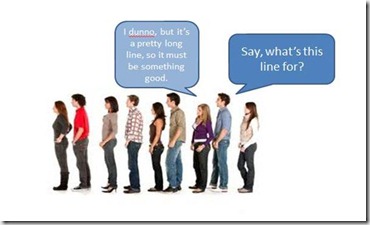Recently I co-wrote a chapter in WOMMA’s upcoming book on measuring word of mouth and social media. In the process of writing this, it became obvious to both me, as well as, the book’s editors that there was no clear definition for what social engagement is.
This was especially troubling given the fact that both brands and agencies everywhere had become intensely involved in either the discussion of social engagement’s benefits, as well as, attempting to implement programs that drove social engagement.
This is the image that comes to mind when I contemplate that interesting fact.

We cannot doubt that social engagement is the one of the most important things to happen to brands since advertising. Given the fact that Google Analytics has deployed social engagement metrics reporting functions, it seems as if the social engagement is the new Six Sigma; everybody wants it and everybody wants to measure its ‘ROI’. Today, it is all the rage.
That said, let’s try not to screw up social engagement like we did Six Sigma.
Whenever we have a new shiny thing, this tends to happen in large part because we don’t think about how to apply it, only that it needs to be applied. A tactical approach to a strategic problem.
Everybody wants to get in the Social Engagement line. Why? Because it is what everyone else is doing. Maybe being in the social line is the right thing but you still need to define why it is the right thing before you hop in line.
So let’s try to define what social engagement is or is not. When working on the chapter, the closest definition we could find for this concept came from Brian Solis, a well-respected authority on CRM. In a November, 2011 post, Brian makes the point that the deeper you drill into an organization’s structure and ability to execute and support ongoing engagement; which requires coordinated interaction between business teams and departments, the less you find until you are faced with the fact that for many, truly supporting social engagement is a ‘meaningless platitude’.
Since we are early in the growth of social, I am more willing to give businesses a mulligan here. Change and evolution do not occur overnight. Heck, Groupon that little start-up that began on a laptop in a coffee shop in suburban Chicago a short time ago has today grown to be a massive organization with thousands upon thousands of employees in a myriad of organized departments churning out miles of bureaucratic red tape. I imagine that for them, adapting to social engagement might not all that different than say Fed-Ex.
However, if at the heart of your organization, dot-com or otherwise, customer engagement (not social) is in your DNA and is part of how you measure your performance, social engagement isn’t a big leap. Ask some of the standard bearers for customer service like Southwest, Zappos and Intuit. Today, I’d even add SAP, EA and Verizon to that list of rapidly evolving to incorporate social engagement into their corporate culture.
So back to defining Social Engagement. What is it…exactly? In the book, we define it as ‘the direct integration of a brand’s internal business functions with external customers and stakeholders. Strategic business imperatives are linked to business actions such as R&D, quality, customer retention management, marketing and sales initiatives. These business actions are pushed outward from the organization to allow individuals with an interest in the brand or the initiative, but often no direct affiliation, to directly participate in the planning, development and deployment of programs which then have a direct and measurable impact on the brand experience.’
Let that soak in for a second. If that is social engagement, and there are a number of smarter people than me who think this defines it pretty well, then if you are in line for social engagement are you sure you are in the right line? Do you really want to commit to that?
Think of it like this. Imagine that the line you are in is full of excited people. You hop in assuming it is for something good. Well for some in the line it is but they know what they are in line for and you don’t. Say you discover that you are in line to join The Marines. Ok, that is a pretty life altering commitment. Is that want you want or were you hoping for a new cell phone?
Being able to define something and understand its impact on you determines how you act or respond. You might be interested in joining the Marines but need to get into shape before you sign up and hit boot camp. You want it, recognize the impact and commitment but make a choice to prepare before engaging. Get it?
In the end, social engagement requires a solid and sober organizational understanding of what it includes and requires, as well as, a collective commitment to execute it. If you are not ready for that, hop out of the line and go get yourself a double caramel macchiato latte and come back later.

